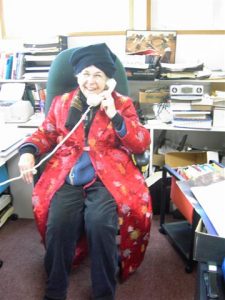I had a hard time making ends meet when I first moved to the Comox Valley. It was 1988, the economy was sluggish, my unemployment insurance benefits had run out and I was dipping into my meager savings. I applied for many jobs but no one was hiring.
As often happens, I found the solution to my problem in a book. To alleviate her financial woes, the heroine in the novel I was reading took in laundry and ironing. A domestic goddess I am not, but after casting around for some skill to market, I decided to take in typing.
My first client was 70-year old Hope Spencer. A writer in her own right, she had yet to conquer the basics of her new computer. So I became her typist in the interim.
But Hope became more than just a client. She knew the owner of Blue Heron Books in Comox and suggested I contact her regarding a part-time job. She also knew a publisher that might be interested in a book I was working on.
And she invited me to some of her parties. It seemed like Hope knew everyone and soon I began making connections in my new home town.
As it happened, both Hope and I belonged to the Periodical Writers Association of Canada. Since I found it difficult to attend PWAC meetings and social events in Victoria, she suggested we hold informal meetings at her place. Hope provided tea, coffee and the use of her huge round table, which she said facilitated discussion.
And she was right — the brown bag lunches were lively and stimulating with writers of every genre talking about what they were working on and asking for and giving advice. At times, PWAC members from Victoria made the trek up island to camp in Hope’s orchard, cook dinner together and talk about the writing life.
In later years, ill health curtailed Hope’s activities but not her interest or support. Whenever she heard about a new book I was working on, she’d call to give me leads I might otherwise miss.
Once, she invited Rick and me to stop by after a late afternoon book signing at Blue Heron Books. When we arrived she served a variety of old cheeses, crackers, a choice of $80 bottles of sherry and — ever frugal — leftover Christmas cake from the year before. It was an unusual combination of tastes that, in typical Hope fashion, proved delicious.
In addition to moral support, Hope often purchased my books as gifts for friends and family. Once she asked me to come over and sign one before she mailed it. She greeted Rick and me at the door wearing a turban and colourful Chinese robe.

“The book’s in this room somewhere,” she announced, returning to her phone conversation. Hope organized the material goods in her life by putting them in piles. We found the book under the sixth one.
Hope died a little over a week ago at age 91. Her Comox church service was packed with people from all walks of life including members of the Unitarian Church and the New Democratic Party. There were also writers from as far away as Victoria and Quadra Island.
After the service there was a party at Hope’s house. She would have loved it – a diverse group of people jammed into the small space, eating, drinking the last of her homemade champagne and talking nonstop.
Wherever Hope went, she brought her zest for life and special gift for connecting with people. Although no longer physically in this world, the legacy of her generous spirit lives on in the many lives she touched. I will miss her.

